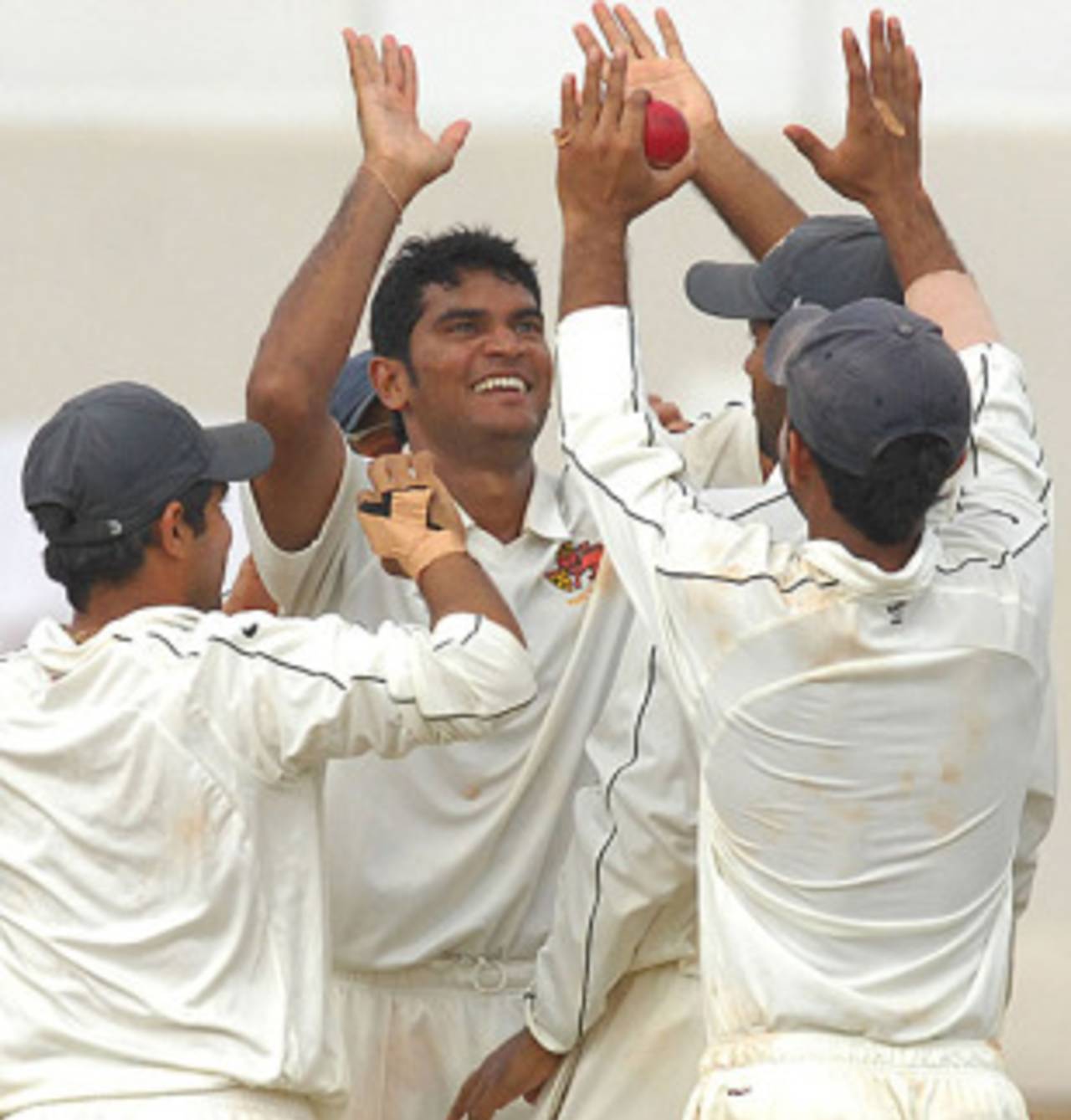Finally Mumbai lived up to the hype. Tirelessly, relentlessly their supporters have played up Mumbai's penchant for a fight, which they believe brings out the khadoos (bloody-minded) character honed on the maidans of India's commercial capital. Indeed it was that characteristic that guided Mumbai to their 39th Ranji title.
In Mysore, on each of the four days, the locals flocked to the venue in huge numbers, baying for the blood of 11 visiting gladiators. But every day Mumbai found a man or two to stand up and silence the enemy.
Vinayak Samant's defiance on the first day restored parity after the visitors were bleeding at 106 for 6 at one stage.
Aavishkar Salvi then spearheaded a spirited comeback on the following day to puncture Karnataka with his first five-for in the season. On the third,
Abhishek Nayar and
Dhawal Kulkarni joined forces to stonewall the rampaging hosts and raise a match-turning 95-run association for the sixth-wicket which bolstered Mumbai's overall lead. Finally, on festive Thursday,
Ajit Agarkar and Kulkarni were at their hostile best with the second new ball as they held their nerve at crucial moments to take their side to victory.
Yet it was not a straightforward march. To go with the hard times, Mumbai suffered setbacks regularly. The year had started with Mumbai losing an important senior in
Amol Muzumdar, when their former captain decided to move to Assam;
Wasim Jaffer lost the toss in all the league games; crucial players like
Rohit Sharma were missed in the semi-finals and final; injuries forced
Ramesh Powar and Nayar to sit out during the middle stage of the campaign. It was a period where the defending champions struggled and could not notch a solitary outright victory in seven attempts.
But the mighty always seem to have luck on their side and so it was with Mumbai. After they earned enough points to qualify for the knockouts, they ran into a Plate team (Haryana) in the quarter-finals and then recovered from a shaky start against Delhi in the semi-finals to make their second straight final.
In the last five years Mumbai have won the crown three times but their reign has been erratic. However they have always remained the team to beat even though fresh and spirited contenders like Uttar Pradesh, Saurashtra, and this year, Karnataka have emerged.
Throughout, the guiding lights have been the experienced hands. At the top of the tree is the calming influence of Jaffer. He might be a simple, reserved man on the outside, but Jaffer can get the message across with his plain-speak. Over the years as a captain he has grown tactically too - the move to push Kulkarni up the order when Mumbai were down on their knees on the second day at 51 for 5 proved to be a masterstroke as the batsman went on to score 87, his maiden half-century, to bring his side back into the game.
In the past, Jaffer has been accused of being aloof on the field, and not aggressive in his captaincy. But in the last two days the otherwise phlegmatic Jaffer was at his most animated. He rushed repeatedly to the bowlers to discuss and adjust field settings, shuffled in his bunker at the slips nervously, and celebrated warmly with his team-mates whenever a wicket fell. Probably it was the needle in the contest that brought him alive. The same could hold true for the rest of his team that brought out their best, when the pressure of the big game was on.
Agarkar, lying low for the most of the season, hit back aggressively with hostile and telling spells in both innings of the final. He was visibly rattled by the controversial run-out decision that sent him back in the first innings, but he put the disappointment behind him admirably and bowled with control.
He deserved to take the last wicket which fetched him a five-for, and raise his arm victoriously and ceremoniously, much to the angst of the locals. He was supported well by Kulkarni, who too, looked like he had lost his mojo after ending as the highest wicket-taker last year. Innocuous throughout the season, his batting efforts seemed to rejuvenate Kulkarni, who bowled accurate and tight spells to support his senior mate.
As the year progressed the other growing concern for Mumbai was the failure of the top and middle-order. The onus was on Jaffer and
Ajinkya Rahane - the top two batsmen last year. But even their consistency dipped; various opening combinations were tried without success. The failure of
Sahil Kukreja and
Sushant Marathe even forced Jaffer to open the innings in the final two matches. Though
Onkar Khanvilkar and Nayar cracked some stubborn knocks they were never consistent. If not for the tenacity of the lower order, Mumbai's journey could have met a premature end.
By no means were battle-scarred Mumbai the most attractive side in the tournament. Unlike Karnataka, who had
Abhimanyu Mithun or
Manish Pandey, Mumbai did not showcase any enterprising youngster apart from
Harmeet Singh, the 16-year-old left-arm spinner who is participating in the Under-19 World Cup in New Zealand. What made Mumbai triumph was their dogged determination to fight until the very end, despite their limitations.
Nagraj Gollapudi is an assistant editor at Cricinfo
